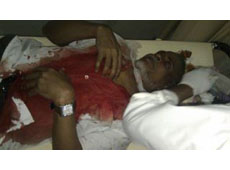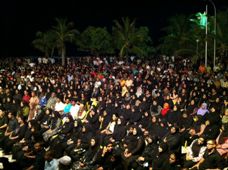Security forces did not take “sufficient measures” to control the unrest in Addu City on February 8 as damage to private and public property could have been “minimised” if police and army carried out their duties, the Human Rights Commission of the Maldives (HRCM) concluded in its investigative report (Dhivehi) released publicly this week.
On February 8, a brutal police crackdown on supporters of the formerly ruling Maldivian Democratic Party (MDP) sparked riots across the country, with police officers forced off many islands while police stations and courts were burnt down in the southern atolls.
Following reports of police brutality and rumours of the death of a protester in Male’, police stations, police vehicles and the police training academy in Gan, as well as court houses, were set ablaze in Addu City. Addu is an MDP-stronghold and the second most populated area in the Maldives after the capital Male’.
Concluding its report on the events of February 8, the HRCM recommended that the Maldives Police Service (MPS), Police Integrity Commission (PIC) and Maldives National Defence Force (MNDF) should investigate the failure to contain the unrest and take legal action against security service personnel who were deemed negligent or responsible for the inaction.
MPS and PIC should also “immediately investigate” allegations of torture in custody and inhumane treatment of detainees from Addu City and take action against the responsible police officers, the HRCM recommended.
In addition, the commission stated that legal action should be taken against police officers who were negligent in providing medical treatment to detainees as well as against officers who “violated the dignity of private households and infringed upon the rights of residents” during the arrest of suspects from their homes.
Moreover, the HRCM recommended providing “training and information on not committing cruel or inhumane acts during arrests or in all interactions with those detained at various stages of investigations.”
The report concluded that the unrest in Addu City “caused fear among citizens and deprived them of a number of rights” while “irreparable damages” to police stations, property and court buildings posed “serious obstacles to provision of many basic services.”
The commission stated that it received complaints of torture and inhumane treatment of detainees in the wake of the unrest and widespread arson, noting that fundamental rights of those arrested were not protected “in an ideal manner”.
“Signs of torture”
In its concluding observations, the HRCM noted that 17 people were treated for varying degrees of injuries caused during the unrest in Addu City. The injuries included a fractured bone and half-inch deep head wound.
During a visit to a detention center in Addu City, the HRCM team observed “signs of torture” on the bodies of 10 detainees who alleged mistreatment, including bruises and wounds on most of them as well as a two-inch deep gash on the shoulder of one detainee.
The team also observed “signs of a cigarette burn on the soles of the feet of one detainee.”
Five to six detainees were kept in cells with a capacity for two inmates, the HRCM noted. Detainees in Hulhudhoo were kept handcuffed in the police station’s sitting room, the commission found, adding that the cuffs were only removed for trips to the toilet.
The HRCM investigative team in Addu City corroborated allegations by the detainees that police officers covered their bodies in ash. The commission noted that several detainees were not treated for injuries despite being taken to the Hithadhoo Regional Hospital on February 11.
Moreover, the detainees alleged that in addition to using obscene language in front of family members during their arrests, police officers threatened to kill and torture them and damage their houses in retaliation.
Based on its findings, the HRCM concluded that police actions towards detainees in Addu City following the unrest of February 8 were in violation of constitutional protections as well as the Universal Declaration of Human Rights and the International Covenant on Civil and Political Rights.
However, the HRCM found that rumours of detainees being abused on coast guard vessels were unfounded as there was no evidence to support the claims.
The commission also took note of serious damage to state assets and property – including court documents – as well as personal belongings of police officers, recommending that the state identify and compensate the officers.
Following investigations of arson by the police, the Prosecutor General’s Office pressed terrorism charges against more than 60 individuals from Addu City, including an MDP MP and a councillor. However, charges have not been pressed against any police officer to date.
On May 30, the PIC issued a press statement revealing that a case against Staff Sergeant Ali Ahmed was forwarded for prosecution after the commission obtained video footage of the accused officer striking an MDP protester while he was on the ground. It is unclear if the case been filed at the Criminal Court.
Responding to allegations by the MDP on August 15 that the commission was “deliberately delaying” releasing its findings to the public for “political interests”, the HRCM issued a press release stating that its investigation into human rights violations on February 8 was “not an investigation that was initiated following a case filed to the commission” but rather a “self-initiated investigation”.
The commission also claimed that the report had been sent to the relevant authorities on May 28, and that it had additionally shared “necessary information” with the public during a press conference on July 18.
Violence in Addu City
In a press conference on February 10, former President Mohamed Nasheed claimed that police and military were “ransacking Addu City.”
Nasheed claimed that police were working together with members of former President Maumoon Abdul Gayoom’s Progressive Party of the Maldives (PPM), who were “dragging people out from their homes and asking them if they are MDP or PPM. If they say MDP, they are spraying them with pepper, beating them and arresting them.”
Minivan News was contacted by a man, identifying himself as an MDP supporter, who claimed to have been “arrested and beaten” on Hithadhoo in Addu City, at 1:30pm on February 9.
He alleged that he was targeted because the Dhivehi Rayithunge Party (DRP) in Addu sent a list of people who had participated in protests to the police.
He was taken from his house with his family: “They threw my sister like a dog, and said all kinds of very bad words to my parents.”
He was taken to Gan with 33 others where the station had been burned.
“They poured petrol around us and said: ‘We will burn you, we can do anything because no one knows where are you are and no one will come to save you.'”
The military and police members allegedly removed some peoples’ clothes, sprayed them with pepper spray, and made them all “dance like dolls. They were doing it for their own entertainment, smiling and laughing.”
On February 11, Al Jazeera reported allegations of “savage beatings” by the police and custodial abuse in Addu City with footage of injuries exhibited by victims.





